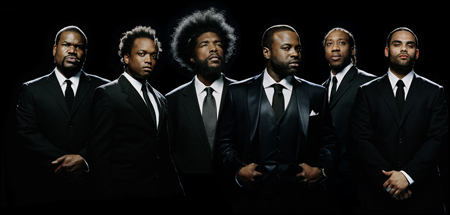
BLEAKNESS: The Roots forgo crossover dreams for ghetto solidarity. |
The wild, idle guessing game over the Roots’ Game Theory (Def Jam) and OutKast’s Idlewild (LaFace/Zomba) is finished. Although OutKast are the biggest, most critically beloved duo in hip-hop, their first new CD in three years got mixed reviews and dropped out of the Top 20 within four weeks, and the Idlewild Hollywood movie, to which the album is the erstwhile soundtrack, fared even worse. Despite massive pre-release publicity, this quasi-musical — starring Andre “3000” Benjamin and Antwon “Big Boi” Patton as musicians in a 1930s nightclub in the fictional town of Idlewild, Georgia — had opening-weekend receipts of around $12 million. That was about the same garnered by End of the Spear, a Christian parable released in January’s doldrums and marketed mostly to Mormons.
Less was expected of the Roots, especially since their expensive 2004 Geffen one-off, The Tipping Point, was a poppish gambit that did less than nothing to break the group out of the bohemian hip-hop underground. Yet the veteran Philadelphia band (with real live instruments!) were personally signed to their new label, Def Jam, by head honcho Jay-Z. It raised hopes that Game Theory might return them to the creative and commercial apex they had reached on their first label, MCA, when consecutive landmarks Things Fall Apart and Phrenology went gold in 1999 and 2002. But though the reviews have been strong, sales have not. In its first three weeks of release, Game Theory plummeted from #9 to #53 on the Billboard 200, 10 spots below the not-so-landmark Kidz Bop Ten, which has been on the chart twice as long.
These commercial shortfalls matter because, as anyone reading this knows, OutKast and the Roots are hip-hop leaders as much as hip-hop artists. Grounded by the somber, introverted flow of Tariq “Black Thought” Trotter, the Roots became a central force in the rebirth of hip-hop’s alternative subculture in the late ’90s, trading alt-rap’s Daisy Age lightness for a grim “realness” that could hold its own against any gangsta brutality. Atlanta’s OutKast went even higher. Although they were originally a part of gangsta’s Southern campaign, they mingled their speedy, druggy boasts with an organic, expansive attitude and musicality reminiscent of prime Prince and George Clinton’s P-Funk heyday, transcending their base without alienating it.
You could say the crews’ latest discs are failures simply because they’re no longer leading anyone. That’s not their audiences’ fault: the Roots’ disc is all about hunch-shouldered withdrawal, and OutKast’s confusing eclecticism attests to a strained relation with the “Ghetto Musick” they once celebrated, not to mention ambivalence about their own career. Yet the more I play these discs, the more I’m convinced this failure is anything but fatal. Both the chilly yet masterful Game Theory and the sketchy yet far-reaching Idlewild reward repeated listenings with satisfying and often moving music that lays out complementary visions of where hip-hop could go, even if these acts aren’t taking their audiences with them.